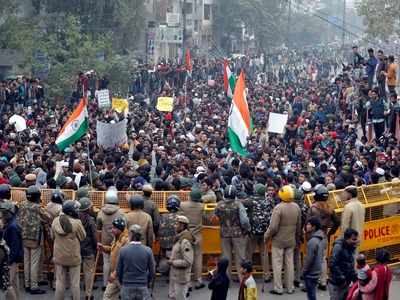- News
- India News
- Citizenship (Amendment) Act 2019: Why has it triggered protests
Trending
This story is from December 17, 2019
Citizenship (Amendment) Act 2019: Why has it triggered protests

Protests in New Delhi against Citizenship Act. (Credits: Reuters)
NEW DELHI: Students across India have expressed solidarity against the police crackdown on Jamia Millia Islamia and Aligarh Muslim University students that took place on December 15 when students in these two campuses were protesting against the controversial Citizenship (Amendment) Act 2019.
Several protests have been organised across the country objecting to the Citizenship Act since it was tabled in the Lok Sabha this month and passed by the Rajya Sabha last week.
Here is all you need to know about the Citizenship Act?
Several protests have been organised across the country objecting to the Citizenship Act since it was tabled in the Lok Sabha this month and passed by the Rajya Sabha last week.
Here is all you need to know about the Citizenship Act?
- What is the Citizenship (Amendment) Act?
The bill that is now an Act makes it easier for the non-Muslim immigrants from India's neighbours - Pakistan, Bangladesh and Afghanistan - to become citizens of India. Though the Bill doesn't spell it out clearly, but the fact that it entitles Hindus, Sikhs, Buddhists, Jains, Parsis, and Christians facing religious persecution in the three nations, to seek Indian citizenship, highlights the exclusion of Muslims. The Act says the refugees of the six communities will be given Indian citizenship after residing in India for five years, instead of 11 years earlier. - Who will benefit from the law?
The Citizenship (Amendment) Act grants citizenship to Hindus, Christians, Sikhs, Buddhist, Jains and Parsis - from Afghanistan, Pakistan and Bangladesh who had arrived in India before December 31, 2014. The legislation applies to those who were “forced or compelled to seek shelter in India due to persecution on the ground of religion”. It aims to protect such people from proceedings of illegal migration from the neighbouring countries. The requirement to stay in India for those belonging to any of these 6 religion for at least 11 years before applying for Indian citizenship has been reduced to five years. Indian citizenship, under present law, is given either to those born in India or if they have resided in the country for a minimum of 11 years. - What makes Citizenship Act controversial?
There are two distinct rallying points of protests against the Act. In the northeast, the protest is against the Act's implementation in their areas. Most of them fear that if implemented, the Act will cause a rush of immigrants that may alter their demographic and linguistic and cultural uniqueness. In the rest of India, like in Kerala, West Bengal and in Delhi, people are protesting against the exclusion of Muslims, alleging it to be against the ethos of the Constitution as it makes religion a criterion for granting Indian citizenship to immigrants. - Who are excluded from the Act's purview?
The Citizenship (Amendment) Act does not apply to tribal areas of Tripura, Mizoram, Assam and Meghalaya because of being included in the Sixth Schedule of the Constitution. Also areas that fall under the Inner Limit notified under the Bengal Eastern Frontier Regulation, 1873, will also be outside the Act's purview. This keeps almost entire Arunachal Pradesh, Mizoram, Manipur and Nagaland out of the ambit of the Act. This is also why there have been such intense protests in Assam and Tripura as only a small part of these states is protected, leaving majority of the state open to Citizenship Act implementation. - How is National Register of Citizens (NRC) connected to Citizenship Act?
The NRC, which identified illegal immigrants from Assam, had been a longstanding demand in Assam. But ever since its implementation, there has been a growing demand for its nationwide implementation. After the updated final NRC in Assam was released on August 31 this year, it excluded the names of over 19 lakh applicants, including Hindus. Now, the CAA will ensure they are not harmed. NRC, which may be extended to the rest of the country, is not based on religion, unlike CAB. - Government's stand on CAA
The Centre has rejected the suggestions that the bill is anti-Muslim. Home minister Amit Shah has said the measure has the endorsement of 130 crore citizens of the country as it was the part of the BJP manifesto in 2014 as well as 2019 Lok Sabha elections. The Act does not discriminate against anyone and does not snatch anyone's rights, Shah said. The home minister said under the Act, citizenship will be granted to refugees coming from the three countries after facing religious persecution there even without documents, including ration cards. This bill is not even .001 per cent against Muslims. It is against infiltrators, the home minister has reiterated.
End of Article
FOLLOW US ON SOCIAL MEDIA










